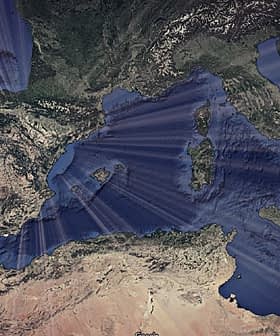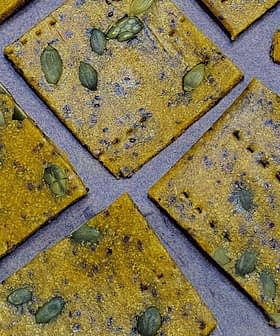Scientific Review Links Med Diet Adherence With Improved Urological Health

A review published in BMC Urology found that adherence to the Mediterranean diet is linked to improved urological health and sexual function in both men and women, with evidence suggesting it can prevent and alleviate various urological conditions. The diet, which emphasizes whole grains, legumes, fruits, vegetables, and olive oil while minimizing red meat and processed foods, may help manage conditions like urinary symptoms, stone disease, urologic cancers, and sexual dysfunction in both men and women. Further research is needed to fully understand the diet’s impact on conditions like prostate cancer, bladder cancer, and renal cancer, but current evidence suggests potential benefits for these diseases as well.
A major review published in BMC Urology has shown positive links between adherence to the Mediterranean diet and improved urological health and sexual function in both men and women.
The researchers found compelling evidence suggesting that the Mediterranean diet may significantly prevent and alleviate a range of urological ailments and conditions.
The Mediterranean diet prioritizes whole grains, legumes, fruits, vegetables and extra virgin olive oil while minimizing red meat and processed foods.
See Also:Health NewsScientifically recognized for its numerous health benefits, the Mediterranean diet remains under-explored concerning its impact on urologic conditions such as sexual dysfunction, urinary symptoms, stone disease and urologic cancers.
A systematic review of 955 scientific papers revealed that adopting a Mediterranean diet can effectively prevent and improve conditions like erectile dysfunction, nephrolithiasis, lower urinary tract symptoms and urinary incontinence.
The prevalence of urologic conditions like erectile dysfunction, hypogonadism, benign prostatic hyperplasia, lower urinary tract symptoms, urinary incontinence and nephrolithiasis is rising, often linked with medical comorbidities such as obesity, hyperlipidemia, hypertension, diabetes mellitus and heart disease.
Mediterranean diet mitigates sexual dysfunction
Cross-sectional studies indicate a lower prevalence of erectile dysfunction among those adhering to the Mediterranean diet, suggesting its potential in mitigating urologic conditions.
Moreover, dietary interventions may influence testosterone levels and fertility, although further research is warranted.
Multimodal treatment approaches, incorporating lifestyle modifications like dietary changes and increased physical activity, hold promise in managing urologic conditions, as guidelines from organizations like the American Urological Association recommend.
Evidence suggests that adherence to a Mediterranean diet may also improve female sexual dysfunction incidence and symptoms, akin to its effect on male sexual dysfunction.
The MEDITA trial observed a reduced risk of new female sexual dysfunction incidence and worsening symptoms among adherents compared to a low-fat diet. However, the trial’s applicability to the general population is limited as all participants had diabetes at baseline.
See Also:Men’s Sexual Health May Benefit From Daily Nut Consumption and MedDietClinical trials assessing the Mediterranean diet’s impact on women with metabolic syndrome revealed significant improvements in female sexual function scores over two years, contrasting with minimal changes in the control group.
Cross-sectional studies also indicate a lower female sexual dysfunction prevalence among women adhering to the diet, albeit confounded by factors like BMI and depression.
While the exact mechanisms underlying the Mediterranean diet’s benefits for female sexual dysfunction remain unclear, hypotheses include its anti-inflammatory and antioxidant properties.
Female sexual dysfunction is multifactorial, influenced by psychological and physiological factors, necessitating a multidisciplinary approach alongside dietary interventions.
Overall, the diet’s potential benefits for sexual dysfunction align with its role in maintaining healthy body weight, reducing saturated fat intake and alleviating inflammatory stress.
Mediterranean diet adherence benefits urinary tract and prostate health
While scientific research on the diet’s effect on lower urinary tract symptoms and benign prostatic hyperplasia is limited, some studies suggest potential benefits.
In the Health Professionals Follow-Up Study, higher intake of vegetables, β‑carotene and lutein was associated with reduced incidence of lower urinary tract and benign prostatic hyperplasia, indicating a potential utility.
However, men with moderate benign prostatic hyperplasia symptoms were excluded from the analysis, limiting insights for this group.
In the Prostate Cancer Prevention Trial placebo arm, higher total fat consumption correlated with increased benign prostatic hyperplasia risk, while frequent vegetable consumption reduced the risk.
Interestingly, dietary factors like polyunsaturated fat intake were associated with increased benign prostatic hyperplasia risk, suggesting complex interactions.
These findings imply that a Mediterranean diet, rich in vegetables and protein while low in total fat, may mitigate lower urinary tract and benign prostatic hyperplasia risk, emphasizing the importance of dietary choices in managing these conditions.
Antioxidants in MedDiet may improve outcomes for urinary incontinence
While studies primarily focus on weight loss benefits for urinary incontinence, a few suggest additional advantages from dietary factors.
For men with prostate cancer, higher vegetable intake improved urinary incontinence, while increased polyunsaturated and monounsaturated fat consumption worsened it.
A cross-sectional study on women found high saturated fat intake correlated with increased urinary incontinence risk, while increased carbohydrate and sugar intake reduced it.
Additionally, high total fat intake correlated with stress urinary incontinence risk in women over 40. Diets inducing inflammation, such as the Western diet, are associated with urgency urinary incontinence.
Although the Mediterranean diet’s direct impact on incontinence is underexplored, evidence suggests its potential benefits, especially for stress and urgency urinary incontinence, due to lower saturated fats and higher vegetable and antioxidant content.
The complex relationship between the Med Diet and stone diseases
Diet plays a significant role in stone disease due to various metabolic risk factors. Higher body mass index (BMI) and insulin resistance in type 2 diabetes patients increase nephrolithiasis risk, particularly for uric acid stones.
The Mediterranean diet reduces stone formation risk, as evidenced by cohort studies showing decreased incidence with Mediterranean diet adherence.
However, some studies contradict this, noting stone formers consume less olive oil and that specific dietary fat content may affect stone risk.
The Mediterranean diet’s mechanism involves urinary alkalization from fruit intake and increased urinary citrate, magnesium and phytate in whole grains, which inhibit stone formation.
Still, oxalate-rich foods like almonds and spinach may pose a risk. The DASH diet, similar to the Mediterranean diet but with lower sodium, also reduces stone risk.
However, sodium restriction and low animal protein intake are advised for hypercalciuric stone formers, and trials showing reduced urinary calcium levels without increasing oxalate excretion support this.
Associations between Mediterranean diet and prostate cancer
Research extensively explores diet’s role in prostate cancer, assessing both risk and prognosis post-diagnosis.
A pivotal 2005 study from the University of California – San Francisco indicated that intensive lifestyle changes might influence prostate cancer progression.
Patients on active surveillance who consumed a diet rich in fruits, vegetables, whole grains and soy, and regular moderate aerobic exercise experienced decreased prostate-specific antigen levels, suggesting potential benefits for active surveillance patients. However, measuring prostate-specific antigen kinetics alone may not fully capture prostate cancer progression.
See Also:Mediterranean Diet Decreases DNA Damage in Men with Prostate CancerThe specific impact of a Mediterranean diet on prostate cancer remains uncertain. While the Health Professionals Follow-up Study found no link between the Mediterranean diet and advanced prostate cancer risk, men with higher Mediterranean diet adherence post-diagnosis showed reduced mortality risk.
Notably, those adhering to the diet often exhibited healthier lifestyles overall. Some studies suggest olive oil and certain nutrients like vitamin E, vitamin C, selenium and lycopene may confer benefits, but results are inconsistent.
Overall, evidence regarding diet’s influence on prostate cancer remains inconclusive, necessitating further investigation despite indications of potential benefits for men with low-risk disease under active surveillance.
Evidence suggests an association between Med Diet and a lower risk of bladder cancer
The effectiveness of a Mediterranean diet in preventing bladder cancer also presents mixed findings.
The European Prospective Investigation into Cancer and Nutrition (EPIC) study, involving 477,312 participants across Europe, noted a potentially reduced risk of bladder cancer with Mediterranean diet adherence, albeit statistically insignificant.
Notably, current smokers, particularly heavy and long-term smokers, showed a decreased risk, possibly due to the Mediterranean diet’s high antioxidant content counteracting smoking-induced DNA damage.
Another case-control study highlighted a negative association, indicating a lower risk with higher Mediterranean diet adherence.
See Also:Olive Oil Offers Promising Role in Treatment of Bladder CancerThis study specifically emphasized the benefits of legumes, vegetables and fish for their anti-inflammatory properties. However, it lacked a control group for physical activity, a known protective factor for bladder cancer.
A meta-analysis of 13 prospective cohort studies reinforced these findings, suggesting a reduced risk of bladder cancer with high Mediterranean diet adherence, potentially linked to increased olive oil intake and polyphenols countering inflammation and oxidative stress, particularly from smoking.
Despite these promising indications, further research is needed to comprehensively understand the diet’s impact on bladder cancer risk.
Mediterranean diet adherence may lower risk of renal cancer
Limited literature exists on the long-term effects of a Mediterranean diet on renal cancer risk.
However, obesity is linked to its development due to increased inflammatory stress and insulin resistance, which promote cellular proliferation and inhibit apoptosis (cell death), favoring tumor formation. Meta-analyses have shown that higher BMI correlates with increased relative risk for renal carcinoma.
While many sources validate the association between obesity and renal cancer, longitudinal prospective analyses assessing the Mediterranean diet as a prevention strategy are scarce.
Case-control studies in Mediterranean countries suggest that diets rich in olive oil, vegetables, whole grains, and fish may reduce the incidence of renal cancer.
For instance, a high intake of cooked vegetables and poultry and a low intake of processed meat are associated with reduced risk, while high bread intake is linked to elevated risk.
The presence of unsaturated fatty acids in olive oil and fish, along with antioxidants in vegetables, may contribute to this protective effect.
However, further research is necessary to ascertain the potential of the Mediterranean diet in renal cancer prevention compared to antioxidant-rich diets.









